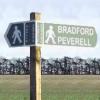
Are you passionate about your community? Do you want to help make a long-lasting change? Do you have innovative ideas for the council? Do you have concerns about a specific issue and want to do something about it? If this is you, then we need you. We need people from all backgrounds and experiences who reflect their community to put themselves forward for election. Make a change and become a councillor.
Here, you will find everything you need to know. We explain what local councils and councillors do, how you can become a councillor, details of the role and what to expect, and local councils a range of resources to help recruit candidates.
What do local councillors do?
Local (parish and town) councils and councillors make a massive difference to local people's quality of life. They are passionate about their communities and seek to make a change to help improve their residents' lives.
Local councils run numerous services, depending on the size of the council. Many you will see day-to-day, but some are less known.
These include introducing solar panels, setting up dementia-friendly groups, organising community buses, creating neighbourhood plans, implementing suitable housing, establishing youth projects, managing allotments and open spaces, maintaining footpaths, public seating and litter bins.
Councillors are elected to represent the local community, so you must either live or work in the council area. Becoming a councillor is a rewarding experience as you will be able to make a change in your community to help improve residents' lives. A councillor’s role can include developing strategies and plans for the area, helping with problems and ideas, representing the community, working with other local community groups, decision making and reviewing decisions and talking to the community about their needs and what the council is doing.
How to become a councillor
There are six simple steps to becoming a councillor:
- Check for elections in your area by emailing your elections officer
- Submit your nomination to the returning officer — find out more about the process.
- Wait for your nomination to be accepted
- Your nomination is made public by the principal authority
- Start your elections campaign
- Polling day — find your polling station
Vacancies after an election (co-option)
If, after an election, there are some unfilled seats, the local council should take steps to fill any vacancies by making co-options within 35 days (not counting weekends and public holidays). However, if the council does not have enough elected members to be a quorum (meaning at least one-third of the council must be elected or three members, whichever is greater), the electoral returning officer must run a by-election to fill the remaining places.
What does a candidate need to do?
• Check with their electoral returning officer if there is a vacancy near you
• Put yourself forward for co-option
• The council may ask you for a CV or invite you for an interview
• The council will choose their co-opted councillor
Casual vacancy
A casual vacancy is a seat that becomes available between elections, which may occur for several different reasons, such as a councillor resigning, becoming disqualified (by committing an offence) or not attending any meetings in six months.
The council clerk will declare the vacancy by posting a note within the parish and notifying the electoral returning officer.
This notice will also confirm that a by-election will be held if at least ten electors request it within 14 days (not including weekends and public holidays). If there is no demand for a by-election, the council will fill the vacancy by co-option.
© NALC. Used with permission.
Want to know more?
Further information about becoming a Parish Councillor including eligibility criteria and how the nomination process works can be found in the document below.



